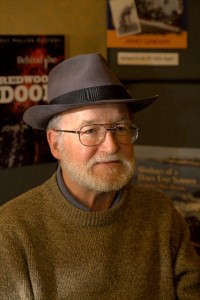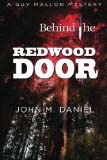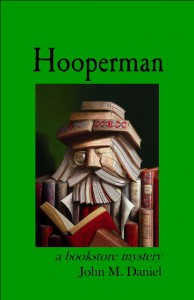Today’s guest post is from John M. Daniel, a former bookseller and creative writer teacher. He is also a freelance editor and the author of fourteen published books, including the well-reviewed Guy Mallon Mystery Series. He was on the faculty of the Santa Barbara Writers Conference for nearly twenty years. He lives among the redwoods in California with his wife. He also publishes mystery fiction under the imprint Perseverance Press. Today, John talks about —
creative writer teacher. He is also a freelance editor and the author of fourteen published books, including the well-reviewed Guy Mallon Mystery Series. He was on the faculty of the Santa Barbara Writers Conference for nearly twenty years. He lives among the redwoods in California with his wife. He also publishes mystery fiction under the imprint Perseverance Press. Today, John talks about —
Choice, Change, and Consequence
To paraphrase Rust Hills, the former fiction editor at Esquire and the author of the book Writing in General and the Short Story in Particular, a story can be defined this way: “Something happens to somebody.” That’s it, and that’s enough. This definition works for any kind of fiction: short stories, movies, plays, and novels, including mystery novels. They all tell of something happening to somebody.
Hills has pinpointed the two necessary ingredient of any story, of any length, in any medium: plot (something happens) and character (to somebody). For extra credit you can add “somewhere,” so that the terse description of a story would be “something happens to somebody, somewhere.” But scene is optional. Plot and character are musts for a story.
And what it is that happens? What gives any story a plot? The character has to change. Our somebody is, at the end of the story, a different person, subtly or dramatically, from the one she or he was at the beginning.
 How does that change come about? It could be because of chance (a trolley runs over somebody’s foot, so somebody is never able to tap dance again); but more often, and more interestingly, it’s because the character has made a choice. The choice was probably a response to some sort of conflict. The story will be about how the character changed because of an important choice he or she made to deal with a conflict, and the change has consequence of its own.
How does that change come about? It could be because of chance (a trolley runs over somebody’s foot, so somebody is never able to tap dance again); but more often, and more interestingly, it’s because the character has made a choice. The choice was probably a response to some sort of conflict. The story will be about how the character changed because of an important choice he or she made to deal with a conflict, and the change has consequence of its own.
Of course this little lesson deals with only one aspect of story, and much, much more could be said about what makes fiction work (and play). I don’t pretend that the writing process is a simple formula. But it’s good to keep in mind these three basic C’s of storytelling: Choice, Change, and Consequence.
In my new novel, Hooperman: A Bookstore Mystery, my shy, stammering hero makes risky choice that opens the plot: he chooses to give up a steady minimum-wage job as a pizza cook and take a job across the street working as a bookstore cop (a spy in street clothes who catches shoplifters in the act) for far less than minimum wage. It’s an unwise choice, perhaps, but it sets off a domino chain of consequences that over the course of the plot change Hoop for the much, much better. I won’t give away any more than that, but here’s an excerpt from late in the book that recalls Hoop’s rash decision.
HOW HOOPERMAN BECAME A BOOKSTORE COP
Almost every afternoon during the spring and early summer of 1972, Hooperman Johnson, the late-shift pizza chef at ’At’s Amore, spent a couple of hours before work browsing the shelves of Maxwell’s Books across the street. By the arrival of summer, he was noddingly acquainted with the stock of the store, and he knew the poetry shelves by heart. More and more, as that spring went on, he spent the hour between three and four up in the front of the store, where he could glimpse the smile of the evening clerk who came on at three, and where he could hear her sassy talk and raucous laugh until he had to cross the street to his own job, which started at four.
By the arrival of summer, Hoop knew enough about himself to recognize that the reason he showed up at the store almost every day was no longer to read the titles of the spines on the shelves, no longer to pet the store cat, no longer to laugh with the members of the Maxwell’s staff, but to be in the same building with Lucinda Baylor. She was the reason that whenever the Maxwell’s evening shift ordered a pizza, he not only cooked it with extra ingredients, he delivered the pizza himself. He also knew enough about himself to keep his distance and limit his conversations. A crush is one thing, but one broken heart was enough for one lifetime.
But when the sign appeared in the Maxwell’s front window in early July, Hoop was tempted. He saw it, more than literally, as a sign. He would have snapped at the chance to work in Maxwell’s Books, even if there were no Lucinda Baylor. And there was.
So on Monday, July 10, two days after the sign went up, he sauntered across University Avenue and walked into the store grinning.
“Hey, it’s Hooperman!” she said from behind the front counter. “Haven’t seen you here since yesterday.”
“The deh,deh,day’s young yet,” Hoop said. “How you dud, how you dud, how you duh,duh,dud…ooing, Luce?”
“Day’s young yet. So far so good. You?”
“That ssssss…hign in the window. You guh,guh,guh,guys got a juh,dge…ob for sss hale?”
Lucinda shook her head. “Yes, but you wouldn’t want it.”
“Are you ki,ki,ki,kidding?”
Hoop thought: you have no idea how much I want this job.
“Elmer doesn’t want to hire a clerk,” she explained. “He wants a policeman. A pig.”
And Hoop thought: Whatever. It’s a cloven hoof in the door.
There you have it, folks. Remember to keep choice, change and consequence in mind when starting to lay out a novel. For more information on John, stop by his website at: www.johnmdaniel.com .
I asked John for a brief synopsis of Hooperman, since it sounded so interesting. Here’s what he said.
Hooperman Johnson works as a bookstore cop, catching shoplifters in the act. It’s a difficult job for a man with a stammer, but somebody’s got to do it, because Maxwell’s Books is getting ripped off big-time. The store is also fire-bombed twice during the course of the story. Set in the summer of 1972, the summer of the Watergate break-in, Hooperman is a bookstore mystery without a murder, but full of plot, full of oddball characters, full of laughs, and full of love, some of it poignant, some of it joyful.
For more information about Hooperman: A Bookstore Mystery, see www.danielpublishing.com/jmd/hooperman.html

I love the setup for Hooperman. I do like pizza, but what’s more important, reading or eating? For some that might be a hard question. Maybe I could put it this way–which one should take more time? Reading, of course! (And not cooking–yuck.)
Cool three Cs, love it! That about covers the ground too. I do have to say that in French literature you can have characters that are challenged and yet don’t change: their immutability under changing circumstances is at the center of the book (I’m thinking of Bazin’s Vipère au Poing – a horrifying portrait of an unnatural, hateful mother). But I guess this is just the exception that confirms the rule!
Interesting post, John. Gotta love those three C’s: Choice, Change and Consequence.
As I write the novels in my Malone Mystery series, it’s interesting to see the choices my main character makes, the consequences she faces and, most of all, the changes (growth) she experiences.
Good stuff, John. I’ve never heard this dissection of a story before, but I like it.
Thanks, Earl.
Wow – two of my favorite Oak Tree writers on the same page – literally! I hope that every indie book store in the country carries Hooperman, John, and why not? It’s perfect. I happened to be in a very large Barnes & Noble a few days ago (far from where I live) and Hooperman was on my mind as I looked through the stacks. Don’t worry — I didn’t steal any books. Happy Thanksgiving, guys!
I’m happy that you didn’t steal books, Eileen!
Subtly put and, oh, so right. Good lesson, John.
Many thanks, John.
Thanks, Melodie. I like your term “inciting moment.” Sounds like “exciting,” but with a strong edge.
So true, John! That’s just the way I teach it. Something happens (a choice, an outside incident) that makes a character leave his comfortable existence and forces him to change – I call this the ‘inciting moment’. Good post to remind us all of the root of ‘story’.